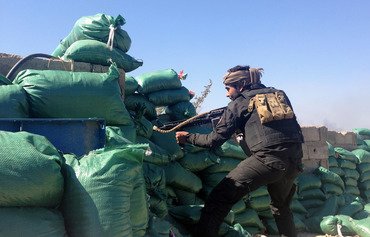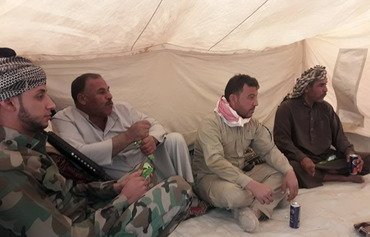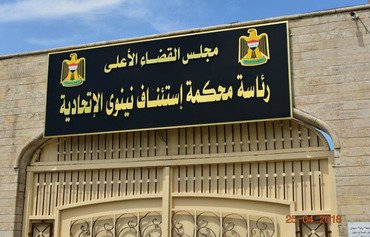Tribal leaders in Anbar say they will support Iraqi forces in maintaining security and stability in towns liberated from the "Islamic State of Iraq and the Levant" (ISIL), revealing tribal agreements to renounce and banish the group.
While Iraqi forces liberated the province's larger cities, such as Ramadi and Fallujah, local officials and tribal leaders began to initiate a new phase of understandings in order to establish security and prevent the return of ISIL.
All the people and tribes of Anbar support the efforts of Iraqi forces to maintain security, said Sheikh Rafi Fahdawi, who leads the council of tribes fighting ISIL in Anbar.
Ordinary people will be an essential part of the province's security operation in the post-liberation phase, he told Diyaruna, adding that there must be a new framework for co-operation between local authorities and civilians.
As the basis of this framework, he said, competent and honest security leaders must assume their duties with the support of Anbar tribes, and the tribal mobilisation forces must be qualified to support the rest of the security forces.
He also stressed the need for the judiciary to take a role in the arrest and prosecution of anyone involved with or belonging to ISIL.
Anbar People's Pact
The Anbar People's Pact, signed by many tribal leaders in the presence of Iraqi Parliament Speaker Salim al-Jubouri and Anbar governor Suhaib al-Rawi, states that those convicted on terrorism charges will be barred from the province's liberated cities.
The pact, signed July 22nd, "invites all the people of the province to co-operate with the security agencies and report all those who belong to the ISIL terrorist group or co-operated with them, in addition to [reporting] all suspicious acts that lead to the destabilisation of security and stability".
The agreement also warns "the families of the culprits involved with ISIL terrorists not to mediate and intercede for them or pay bribes, rather leave the matter to the judiciary, or they will be treated the same as the perpetrators".
It calls on members of the security forces "to be firm and professional and stay away from courtesies and favoritism in this aspect", and for the promotion of judicial independence "through the creation of an investigative authority that has integrity and professionalism".
The pact also calls for "activating the punishments of exile or alienation which were established in sharia and in tribal customs to avoid friction between rival families preserving civil peace".
At the same time, it rejects "the actions of any individual or group to take revenge physically or mentally without referring to the judicial authority or tribal customs corresponding to Islamic law".
Reporting ISIL elements
A number of Ramadi-area tribes have started reporting extremist elements to the authorities, said Sheikh Ihsan al-Assafi, an elder of Albu Assaf tribe.
Tribesmen in the Zankurah area near Ramadi have named 155 members of their tribes who were involved with ISIL during its control of the city, he said.
Their names were submitted to the authorities for prosecution and detention for the crimes they committed against the people of the province, he said.
Zankuarh tribesmen agreed unanimously to sue the defendants, he said, and to prevent their return to the region under any pretext.
In the same vein, tribal council head Sheikh Faisal al-Assafi told Diyaruna the people of Anbar will not forget the injustice they suffered under ISIL.
They will not be lenient with those who killed and displaced them, violated their honour and turned their children into orphans, he said.
Punishment and accountability must not be limited to ISIL elements, he said, but must extend to include all those who facilitated its arrival by words or actions, regardless of their affiliation, as all should be equal under the law.
The tribe is the main pillar of Anbar society, he added, and a large number of deep-rooted Iraqi tribes are known for their animosity towards terrorism and extremism.

![Iraqi military personnel meet with members of the Anbar tribes in Ramadi after the city was liberated from the 'Islamic State of Iraq and the Levant'. [Photo courtesy of the Anbar police directorate]](/cnmi_di/images/2016/08/19/6045-Iraq-ramadi-tribes-600_384.jpg)






